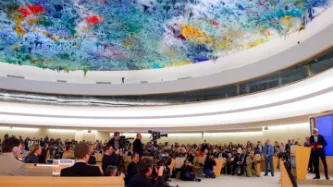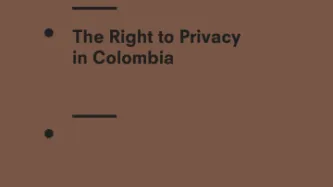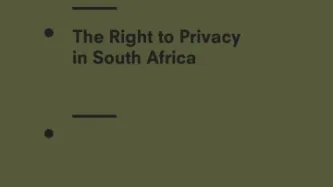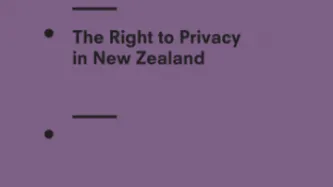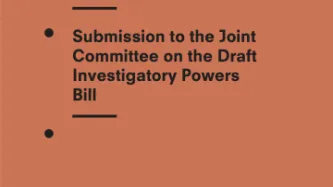Advanced Search
Content Type: News & Analysis
This week the UN Human Rights Committee has issued recommendations to the Governments of Namibia, New Zealand, Rwanda, South Africa, and Sweden to reform and strengthen surveillance and privacy protections.
The Committee recommendations touch upon some of the fundamental issues of surveillance powers and the right to privacy, including mass surveillance, retention of communication data, judicial authorisation, transparency, oversight, and regulating intelligence sharing.
These recommendations…
Content Type: Advocacy
Below is Privacy International’s oral statement to the Human Rights Council 31st ordinary session, 9 March 2016 Inter-active dialogue with the UN Special Rapporteur on the right to privacy. Privacy International's written statement is here.
BEGIN
Mr. President,
Privacy International welcomes the opportunity to participate in this first inter-active dialogue with the Special Rapporteur on the right to privacy. We regret however the Rapporteur’s late submission of his report.…
Content Type: Advocacy
In his first report to the UN Human Rights Council (the main UN human rights political body composed of 47 states from around the world), the UN Special Rapporteur on the Right to Privacy has offered a scathing critique on the UK Investigatory Powers Bill. In particular the Rapporteur noted how bulk surveillance powers, including bulk hacking, are disproportionate and violate the right to privacy as established by human rights courts. The Rapporteur noted that the powers proposed in the…
Content Type: News & Analysis
This week will see the right to privacy take center stage at the UN in Geneva.
The UN Special rapporteur on the right to privacy will present his first report to the UN Human Rights Council on Wednesday 9 March. Meanwhile the Human Rights Committee will review the records of surveillance and the right to privacy of South Africa and Sweden among others.
The new Special Rapporteur on the right to privacy
A year ago the Human Rights Council established the mandate of the Special…
Content Type: Advocacy
Article 17 of the International Covenant on Civil and Political Rights (ICCPR) provides for the right of every person to be protected against arbitrary or unlawful interference with his privacy, family, home or correspondence as well as against unlawful attacks on his honour or reputation. Any interference with the right to privacy can only be justified if it is in accordance with the law, has a legitimate objective and is conducted in a way that is necessary and proportionate. Surveillance…
Content Type: Advocacy
Privacy International, Right2Know, and the Association for Progressive Communications (hereinafter “the organisations”) note the written replies by the government of South Africa to the list of issues on South Africa’s laws, policies and practices related to interception of personal communications and protection of personal data.
The organisations have on-going concerns on the practices of surveillance by South African intelligence and law enforcement agencies. In this submission, the…
Content Type: Advocacy
Privacy International notes New Zealand’s written replies to the list of issues prior to reporting in relation to the New Zealand’s laws, policies and practices related to interception of personal communications.
A review of the security and intelligence legislation is currently underway in accordance with the Intelligence and Security Committee Act. It is expected that the Parliament will consider the review in 2016. Hence this represents a significant opportunity to amend the current…
Content Type: Advocacy
In response to the Government publishing proposed new surveillance powers in November 2015, Privacy International submitted this highly detailed analysis to the Joint Committee on the Draft Investigatory Powers Bill in December. Our report proposes significant changes across the Bill to ensure better privacy protection while still enabling public bodies to have the powers they need.
Content Type: Press release
Privacy International welcomes the Committee’s report on the draft Investigatory Powers Bill (IP Bill). The report mirrors what many from across the technology sector and civil society have been saying: the lack of clarity in the draft Bill risks undermining security and privacy.
The Committee encountered almost universal confusion regarding the meaning of “Internet Connection Records” and what the collection of such records would entail. …
Content Type: News & Analysis
The major overhaul of data protection laws in Europe is finally over, after three years of arduous and sustained political and lobbying activity by all those with a major stake and interest, including us at Privacy International (See our initial analysis of the two laws in 2012). We welcome this long overdue closure, but is this 91-articled, 200-paged piece of legislation been worth the enormous effort and no doubt millions of euros, dollars and pounds spent on it?
The legislative package…
Content Type: Press release
Statement by European Digital Rights (EDRi), Bits of Freedom, Digitale Gesellschaft e.V, Digital Rights Ireland and Privacy International following the vote of the European Parliament’s Civil Liberties Committee on the Data Protection
In January 2012, the European Commission, following extensive consultations, published a draft Regulation and a Directive to create a strong framework for data protection in the EU. The initiative had three priorities – modernisation of the legal framework for…
Content Type: Press release
This is Privacy International's submission in response to the Science and Technology Committee's call for evidence on the draft Investigatory Powers Bill.
Content Type: Press release
A joint statement from international and domestic civil society organisations expresses continued serious concerns regarding the passage of Pakistan’s Prevention of Electronic Crimes Bill. Privacy International, ARTICLE 19, Human Rights Watch, Association for Progressive Communications, Digital Rights Foundation, and other human rights organisations including the Human Rights Commission of Pakistan are calling for the bill currently awaiting debate in the National Assembly to be scrapped and…
Content Type: Press release
Privacy International is deeply disturbed by the Moroccan government’s crackdown on media, human rights defenders, and civi society. Our friend Hisham Almiraat will be appearing in court on Thursday November 19th, 2015 along with six other journalists and human rights defenders members, and is facing the charges of “receiving foreign funding without notifying the General Secretariat of the government” and charges of “threatening the internal security of the State”, an offense that can lead…
Content Type: Press release
28 October 2015
Leading privacy and consumer organizations meeting in Amsterdam this week called on data protection officials around the world to support a meaningful legal framework that would protect the fundamental rights of both citizens and consumers in the online era.
In a statement issued today at the International Data Protection and Privacy Conference, the organizations criticized a just-released “Bridges” report that primarily recommended a continuation of industry self-regulation…
Content Type: Press release
Human Rights Watch and three individuals have today lodged a legal challenge to establish whether their communications were part of those unlawfully shared between the US National Security Agency (NSA) and UK Government Communications Headquarters (GCHQ).
Despite billions of records being shared every day between the NSA and GCHQ, and that historical sharing having been declared unlawful [PDF], the Investigatory Powers Tribunal (IPT) has not yet confirmed to any claimant that their…
Content Type: Press release
In yet another blow to the UK’s surveillance proponents, the UN Human Rights Committee has criticised the British legal regime governing the interception of communications, observing that it allows for mass surveillance and lacks sufficient safeguards.
The latest in a series of calls for wholesale reform of surveillance laws and practices in Britain, and following on the footsteps of reports by the Independent Reviewer of Terrorism Legislation David Anderson QC and Royal United Services…
Content Type: Press release
A new report released today by the Royal United Services Institute (RUSI) highlights key technical blind spots in current GCHQ oversight and calls for a new, comprehensive and clear legal framework governing British intelligence agencies' surveillance capability.
The report panel, which included three former British intelligence chiefs, sets out clear deficiencies in the existing technical oversight regime, explaining current oversight "does not check the code [that underlies GCHQ’s…
Content Type: Press release
The Investigatory Powers Tribunal (IPT) today revealed that the UK Government Communications Headquarters (GCHQ) spied on two international human rights organisations, failed to follow ITS own secret procedures and acted unlawfully.
The targeted NGOs are the South African Legal Resources Centre (LRC) and the Egyptian Initiative for Personal Rights (EIPR). Both are leading civil liberties organisations and co-claimants alongside Privacy International, Liberty,…
Content Type: Advocacy
Following today's Justice Ministers Council meeting in Luxembourg where an agreement was reached on the proposal for a General Data Protection Regulation (GDPR), Privacy International and European Digital Rights (EDRi) issued the following statement:
In January 2012, the European Commission, following extensive consultations, published a draft Regulation. The initiative had three priorities - modernisation of the legal framework for the protection of personal data,…
Content Type: Press release
Governments must accept they have lost the debate over the legitimacy of mass surveillance and reform their oversight of intelligence gathering, Privacy International and Amnesty International said today in a briefing published two years after Edward Snowden blew the lid on US and UK intelligence agencies’ international spying network.
“The balance of power is beginning to shift,” said Edward Snowden in an article published today in newspapers around the world. “With each court victory,…
Content Type: Press release
Privacy International and several other human rights organisations are taking the UK Government to the European Court of Human Rights over its mass surveillance practices, after a judgement last year found that collecting all internet traffic flowing in and out of the UK and bulk intelligence sharing with the United States was legal.
The appeal, filed last week by Privacy International, Bytes for All, Amnesty International, Liberty, and other partners, comes in response to a…
Content Type: Press release
The British Government has admitted its intelligence services have the broad power to hack into personal phones, computers, and communications networks, and claims they are legally justified to hack anyone, anywhere in the world, even if the target is not a threat to national security nor suspected of any crime.
These startling admissions come from a government court document published today by Privacy International. The document was filed by the government in response to two …
Content Type: Press release
The UK Parliament's Intelligence and Security Committee's report provides a long-awaited official confirmation that the British government is engaging in mass surveillance of communications. Far from allaying the public's concerns, the ISC's report should trouble every single person who uses a computer or mobile phone: it describes in great detail how the security services are intercepting billions of communications each day and interrogating those communications against thousands of…
Content Type: News & Analysis
Privacy International, Bytes for All and other human rights groups are celebrating a major victory against the Five Eyes today as the UK surveillance tribunal rules that GCHQ acted unlawfully in accessing millions of private communications collected by the NSA up until December 2014.
Today’s judgement represents a monumental leap forward in efforts to make intelligence agencies such as GCHQ and NSA accountable to the millions of individuals whose privacy they have violated.
The…
Content Type: Long Read
As Privacy International celebrates Friday's victory against Britain’s security services - the first such victory this century - we cannot help but feel the success is bittersweet.
After all, we may have convinced the Investigatory Powers Tribunal that GCHQ was acting unlawfully in accessing NSA databases filled with billions of emails and messages, but with a few technical adjustments the intelligence services have managed to insure themselves against any further challenge, at least in…
Content Type: Press release
British intelligence services acted unlawfully in accessing millions of people’s personal communications collected by the NSA, the Investigatory Powers Tribunal ruled today. The decision marks the first time that the Tribunal, the only UK court empowered to oversee GHCQ, MI5 and MI6, has ever ruled against the intelligence and security services in its 15 year history.
The Tribunal declared that intelligence sharing between the United States and the…
Content Type: News & Analysis
Late last year, the newly-elected government of Indonesia began to take steps which are almost unheard of today: reforming government communications surveillance powers.
The much-needed development, on the back of the victory of President Joko Widodo, comes at a critical moment in the country's history as the relationships that Indonesians have with technology are changing and growing rapidly. A recent poll revealed that Indonesians consider technology to have had a mostly…
Content Type: News & Analysis
The following appeared in the Daily Telegraph, and was written by Carly Nyst, Legal Director of Privacy International:
"Robert Hannigan, the new head of GCHQ, announced his arrival this week with a call for “greater co-operation” with security forces by tech companies. Hannigan’s article in the Financial Times illustrated vividly the destructive ideology that has driven the infiltration by the British and American intelligence agencies into every aspects of the digital realm – an…
Content Type: Long Read
Privacy International in October 2014 made a criminal complaint to the National Cyber Crime Unit of the National Crime Agency, urging the immediate investigation of the unlawful surveillance of three Bahraini activists living in the UK by Bahraini authorities using the intrusive malware FinFisher supplied by British company Gamma.
Moosa Abd-Ali Ali, Jaafar Al Hasabi and Saeed Al-Shehabi, three pro-democracy Bahraini activists who were granted asylum in the UK, suffered variously…


